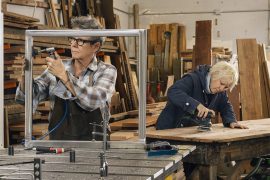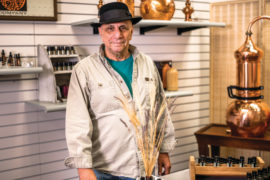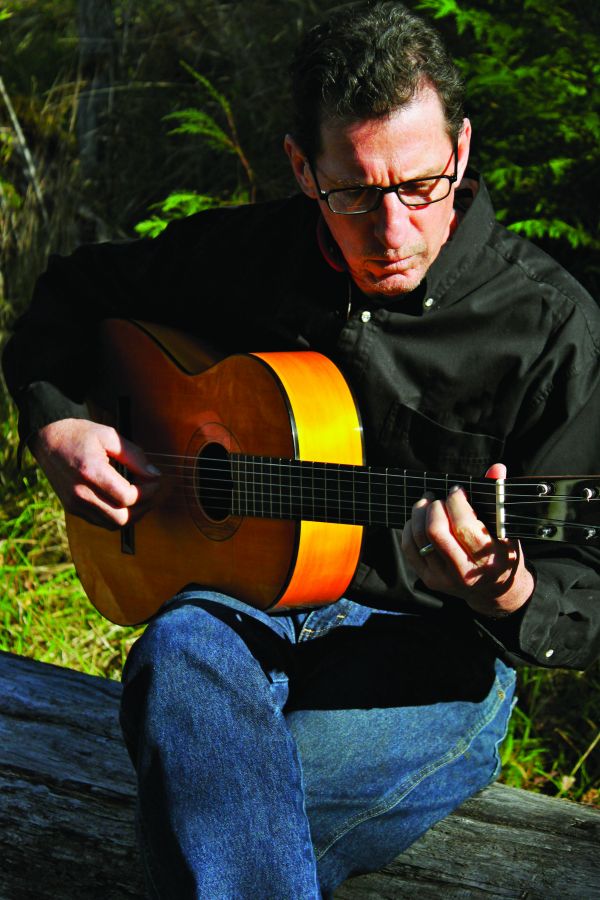Ethical Cannabis Alliance wants to help establish fair-trade cannabis
written by Mackenzie Wilson
Cannabis can’t seem to escape its dark past. The rapidly growing industry of recreational marijuana generated more than $60 million in sales tax for Oregon in 2016, the first year it was legal. The growth is staggering, but Ashley Preece-Sackett, 37, founder of Ethical Cannabis Alliance, said labor standards are lagging. “If you start researching and visiting farms and trim circles, you would quickly see the work practices—the hours, food, bathrooms and sleeping conditions are all below par,” she said.
Preece-Sackett has experienced it firsthand, working in trim circles—people who use scissors to hand manicure cannabis—in Humboldt County, California. “This industry came from an illicit background,” Preece-Sackett said. “A lot of the working conditions are accepted by employees because of our history. If you were to implement those same working conditions in agriculture, it would not pass.”
Since graduating from Boise State University with a horticulture degree in 2004, Preece-Sackett has embedded herself in the cannabis industry. She and her partner, Jeremy Sackett, in 2012, founded Cascadia Labs, a marijuana testing facility with offices in Bend and Portland. After selling her stake in the company a year ago, Preece-Sackett ventured into new territory, starting a nonprofit, third-party certification business to hold cannabis companies accountable when it comes to how their employees are treated. “There is a desperate need to empower and protect labor standards. As more states legalize cannabis, the need for third-party certification to address the problems will only become more urgent,” she said.
Oregon’s Occupational Safety and Health Administration (OSHA) addresses broad concerns for businesses and their employees such as electrical hazards, pesticide exposure, chemical, and fertilizer use, along with other hazards related to the extraction process of marijuana. Preece-Sackett said even though these standards exist, there’s little incentive for companies to do more than the bare minimum.
We don’t even have basic worker safety guidelines for our unique production and processing methods.
—Ashley Preece-Sackett
Preece-Sackett believes the future of cannabis production is all in the seal—a third-party certification will set certain producers apart and add incentive. A good example of how this could work is to look at how some people shop for coffee and fruit. “The more progressive, conscious person will look into the label, the standard and the ethics of how that product was produced to assure they’re putting their money toward something that is protecting people and the environment,” Preece-Sackett said. “There’s a misconception about cannabis that all marijuana is organic because it’s growing from the earth. A lot of average consumers don’t understand the detrimental impacts of growing cannabis on both people and the environment.” Excessive water use and energy consumption along with harmful chemical use are all concerns.
Preece-Sackett is taking her personal experience working in trim circles and combining that knowledge with what she’s learned from interviewing budtenders about the working conditions they’ve faced. She hopes people will start to think of cannabis production as agriculture so organic and sustainable standards can become available, allowing farmers to establish and promote environmentally sound practices. Right now, she said, there’s not a huge demand on the consumer side for fair-trade cannabis simply because it’s not on most people’s radar. “They don’t even think it exists, so they don’t think to ask,” Preece-Sackett said. Ethical Cannabis Alliance is implementing a pilot program for beta testing and expects to bring its certification and seal to the cannabis market by the fall. Preece-Sackett is in the final process of securing funding for Ethical Cannabis Alliance. Dr. Bronner’s, a pioneer in natural products and a company that promotes the independent certification of its soaps, is supporting ECA’s efforts in creating standards. “The momentum is real, and there’s no stopping our efforts,” she said. “We are a unique industry in that we’re self-governing robust standards from seed to sale.”
Cannabis Terminology
Trim Circle: Industry term for employees who hand manicure (aka trim) cannabis inflorescence (flowers) with scissors to be sold in bulk.
Budtender: Similar to a bartender, people who work at marijuana dispensaries helping customers decipher the different strains and other cannabis products.











Great explanation. This is awesome.